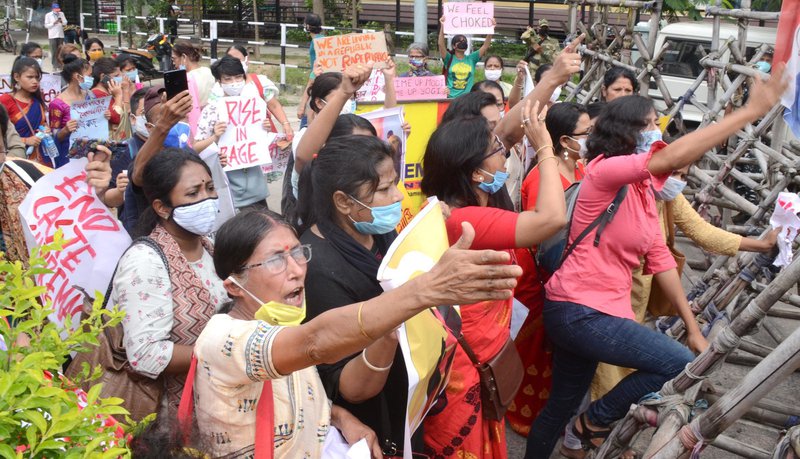The murder of George Floyd in May this year triggered uprisings against and conversations about racism in countries across the world. It felt as though the Black Lives Matter movement – founded in 2013 by three Black women in the US – had gone global on an unprecedented scale.
And while racism is an issue that transcends borders (White supremacy was, after all, a colonial project), it takes on different forms in different contexts. What constitutes racism in Canada may look quite different from racism in India or Brazil.
As part of our 12 Days of Resistance series, we take a look at seven forms of women-led anti-racist activism around the world.
In Germany, migrant and refugee women are drawing attention to police violence. In early June, a group called International Women* Space (IWS) highlighted violence by police officers against women living in Berlin’s lagers, where asylum seekers are housed. IWS also initiated the ‘Lager Reports’, which look to combat isolation and turn women into reporters on the frontlines of the COVID-19 pandemic in refugee accommodation centres.
In Lebanon, domestic workers are fighting the kafala (sponsorship) system. Migrant workers – many of whom come from Ethiopia, and other African and Asian countries – are excluded from labour laws that set out minimum wages and maximum hours. The legal status of foreign workers is also tied to their employer, which can lead to exploitation and abuse. Local grassroots organisations have been campaigning for the abolishment of kafala; earlier this year, the Anti-Racism Movement (ARM) released a video called EndTheirLockdown, which draws parallels between the country’s COVID-19 restrictions and the everyday reality for many migrant workers in Lebanon.
Hopes were raised in September, when Lebanon’s then-labour minister, Lamia Yammine, announced a new contract that would “abolish the sponsorship system and enshrine the rights of migrant domestic workers”. The new contract was ultimately rejected, but the increase in political will to protect this group is a promising result of activists’ efforts.
- Read the first-person account we published from a migrant domestic worker in Lebanon named Winnie.
Record numbers of Black women ran for – and won – seats in the Brazilian municipal elections. Before Brazil’s local elections in November, we reported on how more women – including Black women – were running for municipal office than ever before, with many doing so through ‘collective candidacies’, which challenge an individualistic approach to politics. Even better news: many of them won – and record numbers of trans women were elected to city councils.
In Italy, young activists are harnessing the power of social media to have a much-needed conversation about racism. As we reported in September, new and second-generation immigrants in Italy are using Instagram to raise awareness of domestic racism. By posting pictures of people from different ethnic minority groups holding up a sign reading “#I’mStillAlive”, the @imstillvlive account quickly gained more than 5,000 followers. Across the world, similar accounts – such as @la.charge.raciale in France and @zetjein in the Netherlands – demonstrate the unique potential of social media as a means for young people to make their voices heard and to shift the conversation on racism.
In India, Dalit women are fighting for land rights. While white supremacy and colourism are current issues in India, understanding the nation’s racism requires talking about its historic caste system, in which Dalits (once called ‘untouchables’) are at the very bottom of the social, political and economic ladder. For Dalit women, this also translates into higher rates of sexual assault.
But Dalit women are refusing to accept these injustices. One important battleground is land itself: the recently passed Farmers Bill cemented the exclusion of Dalit farmers from land auctions. In response, Dalit women boycotted the auctions, pooling their resources to create an alternative system to sustain their community.
(It’s worth noting that the caste system is also a problem outside India: in October, 30 women engineers broke the silence on how caste-based discrimination has travelled to Silicon Valley in the US.)

In the US, indigenous women fought voter suppression – and won more seats in Congress than ever before. For Native American communities living on reservations in rural areas, as for other marginalised groups, voting is challenging: ballot boxes are sparse, and many states require a permanent residence address to register to vote, which excludes many indigenous voters. But activists took up the challenge and mobilised, with staggering results in areas such as Apache County, Nevada, which saw a 116% increase in voter turnout compared to the 2016 election.
What’s more, 18 indigenous women ran for Congress, the record for a single year. Not only did Democratic representatives Deb Haaland and Sharice Davids retain their seats, but they are now joined by Republican Yvette Herrell.
- Read more about how Trump was taken down by women of colour, such as Ginger Sykes-Torres, an environmental consultant and a member of the Navajo tribe in Arizona, who worked to increase voter turnout in her community.
And we must also mention the intersectional, anti-racist and feminist platforms that are flourishing across the internet. National and cultural contexts are key to understanding the global struggle against racism, but anti-racist work can and does extend across borders. The digital realm is one example of that: from AzMina in Brazil to gal-dem in the UK (check out their new podcast, ‘Growing up with gal-dem’) to Feminism in India, and Salty World and @changingwomxn in the US, the past decade has seen an incredible rise in the number of women of colour producing their own media, and taking back control of their own narratives.
Common Dreams | Radio Free (2020-12-31T14:56:13+00:00) 7 Ways Women of Colour Resisted Racism This Year. Retrieved from https://www.radiofree.org/2020/12/31/7-ways-women-of-colour-resisted-racism-this-year-2/
Please log in to upload a file.
There are no updates yet.
Click the Upload button above to add an update.